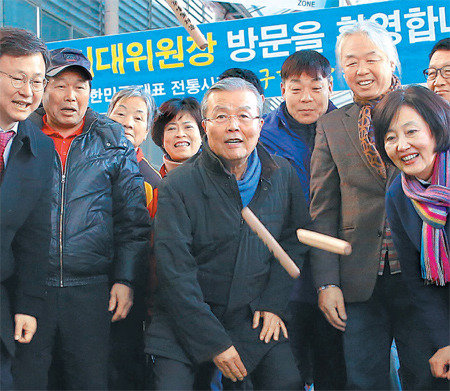Minjoo Party’s interim leader faces opposition from within and outside party
Minjoo Party’s interim leader faces opposition from within and outside party
Posted February. 22, 2016 07:14,
Updated February. 22, 2016 07:20

The People’s Party, which is competing with the Minjoo Party to lead the opposition camp, is focusing its offensives on Kim’s identity. Voices of opposition have emerged en masse even within the Minjoo Party, which appeared to be regaining stability after the inauguration of Kim’s leadership, causing tension to escalate.
Controversy over Kim’s "identity," which was sparked by his mention of "North Korea’s destruction," is mounting further in the wake of recruitment of former Trade Minister Kim Hyun-jong, who spearheaded the conclusion of the Korea-U.S. free trade agreement during the Roh Moo-hyun administration, on Thursday last week. Former Trade Minister Kim fueled controversy by saying that South Korea should be able to shut down the Kaesong Industrial Park by ourselves.
Former lawmaker Chung Dong-young, who joined the People’s Party, blasted both Moon Jae-in, former chairman of the Minjoo Party, and Kim Jong-in on Sunday due to Kim Hyun-jong’s remarks. In his Facebook page post, Chung said, “I recall what (former) President Roh Moo-hyun said. You should be ashamed.” He made the remarks to refute Moon’s Twitter post on Friday, which read “Chung Dong-young’s joining the People’s Party. That’s great. Now (political) structure has become clear. It has become clear who the orthodox successor is.” Chung, who was the opposition’s presidential candidate in 2007, and Moon, who was the standard bearer in 2012, openly exchanged verbal attacks against each other over the identity of the opposition camp.
“Kim Jong-in is denying the 'sunshine policy' of former Presidents Kim Dae-jung and Roh Moo-hyun through his mention of North Korea’s destruction,” Chung said. “First-term lawmakers or reformative lawmakers would have stood up to oppose the recruitment (of Kim Jong-in and Kim Hyun-jong) and to demand their resignation.”
Against this backdrop, Kim Jong-in continued his strategy of "disregarding." “Well, he just may have written a post because he felt bored,” Kim said. During his tour to check people’s livelihood in Seoul’s Guro district on Sunday, Kim told reporters, “I don’t understand what it means,” adding “People reportedly mentioned identity, but I don’t know what identity itself is. I don’t want to comment on an individual’s writing.”
However, acts of opposition started to emerge within the party as well. Rep. Jang Ha-na, a member of the parliamentary Environment and Labor Committee, uploaded a Twitter post entitled "On the recruitment of former Trade Minister Kim Jong-hyun,” which read, “The party’s leadership should revoke his recruitment.” It was the second statement protesting recruitment of Kim Hyun-jong after Rep. Shin Jeong-hoon last week.
Some members in the party interpret the protests as expression of "discontent" that they have been trying not to disclose thus far. Some lawmakers have displayed critical views on Kim Jong-in’s remarks that were critical of the sunshine policy and economic policy of the late former President Kim Dae-jung, who was the origin of their party. A party official said, “If nomination process (for upcoming general elections) starts in earnest, and when the names of would-be candidates who will be excluded from nomination start to be mentioned, discontent among the party’s members that have accumulated thus far could be unleashed en masse.”
길진균기자 leon@donga.com
Headline News
- Med professors announce intention to leave hospitals starting Thursday
- Bridge honoring Sgt. Moon Jae-sik unveiled in Pennsylvania
- Chief of Staff Chung tells presidential secretaries to stay away from politics
- US FTC bans noncompete agreements
- N. Korea launches cyberattacks on S. Korea's defense companies







